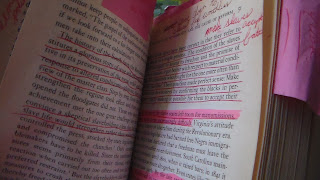What Makes Us Who We Are?
Just the other day, I was making a video for a college assignment. It was for an American Revolution class, and I had to share my research about Thomas Jefferson's legacy. I decided to use some photos in this video that I had recently taken at a museum.
Then I had a brilliant idea! I could dress Taliesin, my young teen son, up as a young Thomas Jefferson and have him hand me the photographs.
So I asked him if I could dress him up like Thomas Jefferson for my video. We could pull his hair back in a ponytail. He could wear a white shirt and a nice black jacket. I could say things like "Thanks, Thomas."
Taliesin refused. Not because he did not want to help me with my video. He refused because, as he explained, he would never portray a slave owner.
Some people think this is rather silly. Thomas Jefferson was a founding father. He spoke against slavery and for the rights of all. He is the primary author of the Declaration of Independence. His ideas were hugely influential on our Constitution. But, the fact still remains in Taliesin's mind, that he owned other human beings.
Taliesin has always been passionately against slavery - since we first read Who Owns the Sun? and Follow the Drinking Gourd so many years ago. He engrosses himself in studies of Civil Rights and has for years. I will never forget the first time we read about Brown versus the Board of Education. He was probably seven or eight. He forced himself to hold back the tears.
But Taliesin has had his own experiences of oppression. Not in the form of racism. He has had oppression because of his different ways of learning. He has had oppression because he likes pink. He has been teased and questioned because he has never had a gender limit on what he likes and does not like.
He knows what it's like to be bullied because of perceived differences or societal differences.
I had someone ask me the other day how she and I, both as Christians, can think so differently politically. Now, I am not a conservative. I used to be, but that changed. I am not a liberal. But I also am not a moderate.
I explained to her that my viewpoints have changed with my own, individual study of the Bible. Not of Bible teachings in which other people explain the Bible to me. In my own, individual study of the Bible.
I have heard others say they have become more liberal since studying the Bible on their own. I believe this is true.
However, I also believe we are shaped by our experiences.
The type of oppression I have experienced has come from the church world - from my fellow Christians. Whether that be from the spiritually abusive environment I endured for not quite two years or from subtle forms of discrimination because my ideas or life may not be the same as the doctrine of established, institutional churches, I have experienced oppression from the privileged.
That caused me to do what, unfortunately, many others have not. In our culture that equates God with established churches, when so many people experience oppression from churches, they turn away from God. However, my roots in the Bible run too deep for that. I immersed myself in a study of the Bible. I studied how Jesus acted. I studied His teachings. I did not study with a doctrinal slant. In the words of Paul, "For I resolved to know nothing while I was with you except Jesus Christ and Him crucified" (I Corinthians 2:2, NIV).
My experiences demanded that I undertake such a study. Those experiences and this astute pursuit changed me. I grew, not in a different direction necessarily, but crookedly. I did not have a straight idea anymore. My thinking became gray rather than black and white.
I have been reading the book Roll, Jordan, Roll by Eugene Genovese. It's a classic book on slavery written from a Marxist perspective. Needless to say this book is controversial in many conservative circles.
I, however, see a lot of value in this book. In fact, I have so many notes written in and about this book, I am having a difficult time finishing it. I want to take my time and savor the author's words.
Many fellow historians say Marxist history has an agenda to counter traditional history. I'm sure that is the case. I know of no historical interpretations that do not have an agenda of one sort or another.
However, I do believe the Marxist perspective takes a more in-depth look at the actual experiences of real people. Many of our traditional histories look good on paper. Marxist historians dig into the less polished dirt and grime we call experience.
We are all shaped by our experiences, whether we want to believe it or not. As a minister and historian who is ardent for social justice and equality and diversity; I could share story after story from history and today's society that reflect this fact. Real diversity happens when we allow our ideas to be molded by our own experiences and the experiences of others - when we allow ourselves to even slightly bend from our preconceived notions and attitudes; when we learn that there are other people in the world who do not have the same experiences we have. It is only then that privilege will dissipate.


Comments
Post a Comment